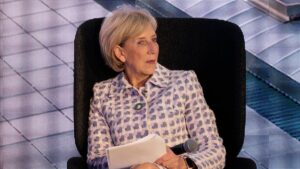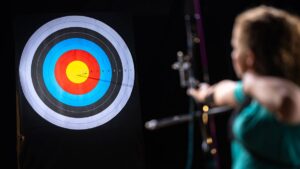Lynas boss on building a rare earths powerhouse and why diversity is good business

Greater diversity leads to better solutions according to LYC. Pic: Getty Images
- Lynas head Amanda Lacaze said the key to running a business successfully is unlocking capability of its people
- Since becoming CEO and MD in 2015 Lacaze has grown Lynas from a $133 million to $7 billion company
- Lacaze said diversity broadens the talent pool, creates richer conversations and better solutions for companies
When Lynas Rare Earths (ASX:LYC) MD and CEO Amanda Lacaze started her career, she says, there were traditionally three job choices for women – nursing, teaching or secretary.
Fast forward to 2023 and Lacaze’s career has been impressive. She joined the LYC board in January 2014 as a non-executive director and by June of that year had been appointed MD and CEO of what is now the world’s biggest rare earth’s producer outside of China.
Lacaze brought 25 years of senior operational experience to LYC, including as CEO of commander communications, executive chairman of Orion Telecommunications and CEO of AOL|7.
She was also the MD marketing at Telstra (ASX:TLS), held various business management roles at ICI Australia and had early experience in consumer goods with Nestle.
Lacaze was the keynote speaker at the Women in Mining & Resources Queensland Investing in Women in Resources Networking Breakfast on the Gold Coast yesterday, which was sponsored by Stockhead.
The Investing in Women in Resources breakfast is now a fixed part of the program for the annual Gold Coast Investment Showcase by Vertical Events, where over 50 resources companies are showcased.
By her own admission Lacaze said when she took on the top job at LYC, the company was “on the knife’s edge”.
“After three board meetings it was very apparent there were very serious challenges in all parts of the business,” she said.
“I either had to put my hand up to be part of the solution or resign from the board and I chose to put my hand up to be part of the solution.
“It was this far away from going belly up.”
Lacaze said the people in the business deserved better and she wanted it to not only survive but thrive and if it had of failed then its employees, including those in Malaysia, would have lost their jobs.
“There was no golden parachute for them so they deserved someone to give it their best shot,” she said.
“To put this in perspective just after I joined our equity value was about $133 million and yesterday it was about $7.5 billion so that gives you a sense of what you can do if you focus on the right things and do them well.”
What would Lacaze know about rare earths?
Lacaze said when she took the job, a journalist wrote a story asking what she would know about rare earths.
“I thought none of us are born knowing about rare earths and have to learn,” she said.
“I thought I’m relatively smart so I think I will learn but what is much more important is I rarely see businesses get into trouble because they don’t know enough.
“They get into trouble because they don’t unlock the skills and capabilities of the people in the organisation.”
She said across all different industries there is one commonality – people.
“I am an intellectually curious person and I like to address new challenges and people like to spend a lot of time talking about the things that are different but I can tell you there are more things which are the same across industries,” she said.
“In all instances you are dealing with people.”
Rebuilding Lynas to multi billion company
Within 18 months Lacaze had the Lynas Advance Material Plant (LAMP), the world’s single largest rare earths processing plant, located in Gebeng near the city of Kuantan in Malaysia, operational.
The plant produces high-quality separated rare earth materials for export to manufacturing markets in Asia, Europe and the US.
“This billion dollar plant when I arrived was just not working,” Lacaze said.
“If you have no production, you’ve got no customers and you’ve got no money and life is really very difficult.”
Lacaze said she was asked by an investor in Malaysia how many people did she bring in to get the plant operational.
“I said none because I couldn’t ask any anyone to leave a well paying job and work here when we were literally on a knife edge with $14 million in the bank,” she said.
She said the investor then asked if the people at LYC probably always knew the answer as to how to get the plant up and running.
“I said probably but there were one of three things happening either they weren’t being asked the question, or if they were then not being listened to or people weren’t asking the right questions,” she said.
“Generally the answer is known but it may not be the answer people think they know.
“Asking the right question to uncover the true insight is the most important thing you can do.”
Lacaze said LYC’s success has been based on a disciplined team-based approach with all members showing determination and resilience.
Mining in the 21st century
Lacaze said mining is high tech and highly skilled industry in the 21st century and a rapid adopter of technology.
“Mining is not just a bunch of boofheads shoving dirt around and mining is not low key,” she said.
“It is a high tech, high skilled industry and well ahead of most other industries in adopting new technologies and a lot of those are driven by a determination to be safer for our people.”
Lacaze said of the highest risk activities in any mining enterprise is mobile equipment.
“As we move to driverless trucks and driverless equipment it is about protecting our people,” she said.
Lacaze said jobs are now vast in mining from various types of engineers, geologists, electricians, drivers, finance specialists, environmental scientists lawyers, medicos and mechanics to communications, IT, safety, and HR professionals.
“Mining operations are often in remote areas and if FIFO works for you its fabulous with terrific lifestyle opportunities,” she said.
The case for diversity
Lacaze presents a strong case for diversity in business but not just gender diversity, although this is an area to which she is passionately determined to break down for the future.
“I have been working for more years than I am going to fess up to and it hasn’t really changed and the statistics don’t lie unfortunately,” she said.
“I remain one of only a dozen female CEOs on the ASX 200 and that is not good enough.
“Our company has a female chair and CEO and that is remarkable but it should not be remarkable in 2023.”
LYC has grown its female workforce from 63 in 2015 to 235 today across all aspects of the business. Lycas said diversity is a business improvement strategy and broadens the talent pool.
“We have 12 different nationalities in our first two layers of management and are truly a global company,” she said.
“The more diverse inputs the richer the conversation and better solutions you are going to find.”
The LYC share price today:
Related Topics

UNLOCK INSIGHTS
Discover the untold stories of emerging ASX stocks.
Daily news and expert analysis, it's free to subscribe.
By proceeding, you confirm you understand that we handle personal information in accordance with our Privacy Policy.








